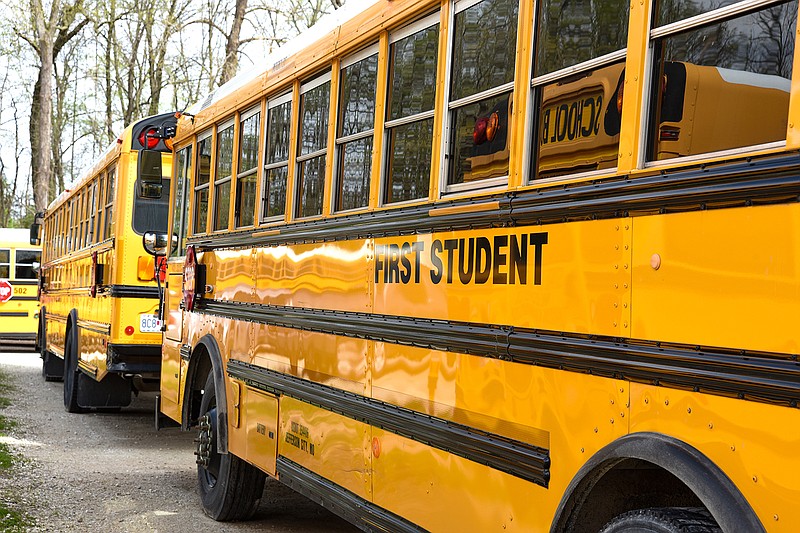[<a href="https://www.newstribune.com/news/health/" style="color:#33AEFF">access the News Tribune Health section</a>]
Due to the novel coronavirus, the Jefferson City School District has to make many changes and create many plans.
At the Board of Education meeting Monday, the board approved and discussed changes involving remote learning, the bus contract, the graduation policy and the budget.
Superintendent Larry Linthacum said the district has a list of questions district leaders are creating plans for, including how students will receive their items still at school, how Chromebooks will be returned, how students will receive yearbooks, how parents will get lunch money back, how students can turn in hard copies of completed work and if events are being postponed.
Linthacum said the district will continue to make plans and adjustments based on feedback from staff and families and communicate once plans are made.
"There are just so many things that we're working through, and we'll communicate and be proactive with that," he said.
On April 3, the district sent a survey to seniors and parents of seniors on if they would like graduation, prom and baccalaureate to be postponed. Two hundred and fourteen seniors and 317 parents responded, and the survey won't close until at least half of the seniors respond.
An overwhelming majority of students said they want a normal graduation and prom even if they are postponed. Thirty-one percent of students said they would want baccalaureate to be in May, and 24 percent said they wouldn't mind if it was canceled. The district will create a plan based on this feedback.
The board voted to amend the district's graduation policy based on the Missouri School Board Association graduation policy, which waives requirements for end-of-course exams, requires students earn proficiency credit through other means, allows some requirements for transfer students to be waived and requires special education students' graduation requirements are determined by his or her IEP team.
The district has identified which students don't have internet at home through contact teachers have made with students. The district will provide wireless MiFi hotspots to these students beginning today, Chief of Learning Brian Shindorf said.
When schools first closed, the district installed exterior WiFi access points to each building for students to access if needed, but that wasn't a long-term solution. The technology department has been working to get them configured, and the plan is to have the 715 devices provided to students by early this week, Shindorf said.
Each teacher page on jcschools.us now includes learning templates that provides parents with expectations for what students should do each day by grade level. These templates have been modified and changed based on feedback from staff, Shindorf said.
Teachers are designing instruction every Monday and Tuesday, and they are checking with students and parents on other days.
Lorie Rost, the elementary education assistant to the superintendent, and Gary Verslues, the secondary education assistant to the superintendent, are meeting with principals each week to discuss what can be improved. Instructional models are continuously being modified based on feedback from staff, families and students.
Verslues emailed families Friday with information on what was changed based on feedback. Teachers are being asked to record Google Classroom lessons so students can watch later, to have group instruction two days a week and to use Friday as a "catch-up" day.
Verslues said he is hoping Fridays can be a time for students who are struggling to make contact with teachers. The district is logging and monitoring which students are not connecting with teachers, Shindorf said.
Custodians and maintenance workers are still working, and a chemical biological engineer will soon train custodians on chemical use and cleaning techniques to make sure the building is clean for when the buildings reopen, Director of Facilities Frank Underwood said.
The closure will save the district approximately $2.3 million this school year, Chief Financial/Operating Officer Jason Hoffman said. Savings will be from energy savings, no substitute teachers, waste management savings and more.
The board approved a contract amendment with First Student. The original contract was based on 174 school days and it said if that changes, they have to negotiate to adjust rates. The district has been negotiating with First Student since the schools closed, Hoffman said.
First Student's rates are based on covering the cost of buses, facilities, payroll, upkeep of buses, corporate overhead and profit. The district agreed to pay 65 percent of the regular route costs from March 18 to April 10, which is the cost to run payroll for bus drivers for each of the days.
The district is paying 45 percent from April 13 to the end of the school year. The contract states that districts will pay bus contractors "to the greatest extent practicable." First Student agreed 45 percent was the greatest extend practicable, Hoffman said.
Twenty-seven monitors and drivers are ineligible for unemployment. First Student will furlough the majority of drivers but maintain these 27 who will drive the routes for JC Schools meal program, "Mission Nutrition."
For more information, visit the COVID-19 page at jcschools.us.

